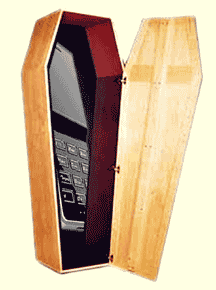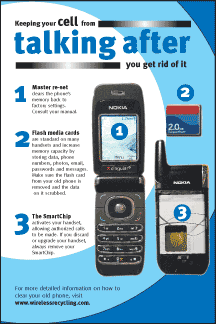|
Loading
|
||||||||||||||||||||||||||||||||||||||
|
||||||||||||||||||||||||||||||||||||||
Your Cell Phone’s Afterlife
|
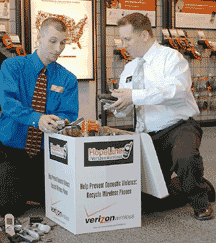 |
Verizon Wireless’ HopeLine program, above, accepts electronic devices of any condition or model.
|
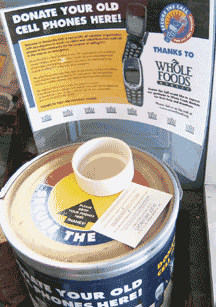 |
Locally, in 2006, Verizon Wireless and the Verizon Foundation donated $52,500 for the expansion of Anne Arundel Medical Center’s domestic violence program. Verizon Wireless also plans to donate money from the HopeLine bin in its new Prince Frederick store to Calvert County Health Department’s Crisis Intervention Center.
Sometimes battered women’s shelters directly contact the HopeLine foundation, requesting cell phones. In that case, if your phone’s still in working condition, it could pass along to a woman in need.
The donated phones, Cunningham explains, “come with 3,000 minutes to make local or long distance calls for free and can be used for confidential communication with lawyers or counselors.”
Aged Phones for Seniors
A Secure the Call cell phone recycling bin outside Whole Foods Market in Annapolis Harbour Center beckons passers-by to toss in senior cell phones. On a recent visit, the bin was overflowing. Most recyclers don’t know that once donated, their old phones help the elderly.
“Most of our phones go to senior citizens,” says volunteer Neal Holtz of Secure the Call, a locally based non-profit organization that converts aged cell phones into emergency-only phones. “Nearly every person today has a cell phone, except senior citizens.”
Any charged cell phone can reach 911, even without a wireless service provider. To make phones emergency-ready — which is the ultimate goal of Secure the Call’s recycling — volunteers get to work.
Secure the Call starts by sorting the phones. Volunteers in Takoma Park — the only full-time employee is a driver — sort the discarded devices by model and condition, then clean the phones and clear all information. Most of the volunteers are high schoolers, from Montgomery, Anne Arundel, Prince George’s and Howard counties, satisfying their service learning requirement. Phones that don’t make the cut are sent to a recycler in Florida, which trades emergency-ready phones to Secure the Call.
What about all of the contact numbers in your phone book? Secure the Call performs a hard reset, setting your phone to the same status as when it left the manufacturer’s factory.
“It’s really important that we respect the privacy of those that donate,” Holtz says. So even if you don’t erase your phonebook, Secure the Call will.
The non-profit’s partners — local senior citizen centers, battered women’s shelters, police and sheriff departments — receive phones almost daily.
“Last year we distributed roughly 250 to 300 phones to local seniors,” says Corporal Jimmy Miller, senior liaison for the Anne Arundel County Police Department. Seniors use these phones to call the police or the fire department in situations ranging from a flat tire to a dire health emergency.
|
Before You Recycle Just like any electronic device, cell phones store data. While your parents’ phone number might not be top-secret data, digital devices like Blackberry and Trio often contain personal information, like email addresses and banking passwords. The majority of electronic recyclers will perform a hard reset on your phone, erasing all information, but they aren’t obligated to. “We’re not legally liable for what someone left on their phone,” says Seth Heine, president of Collective Good International, a mobile phone recycling company out of Georgia specializing in reuse. “But we don’t want any roadblocks to get in the way of someone’s decision to recycle, so we’ll clear the information.” The procedure to perform a hard reset, which returns the phone to a factory-fresh status, differs among manufacturers. Regardless of phone manufacturer, user manuals or websites should provide the procedure to perform a hard reset. Most wireless service providers carry Motorola cell phones, making it a popular manufacturer. For this type of phone, a master clear erases all information you’ve entered – including phonebook contacts, datebook entries and downloaded information – for good. To accomplish this reset yourself, you’ve got to know your phone’s security code. If you don’t know that number, a local wireless store can bypass the security code, using flash software to erase personal information on any cell phone. As long as the store has the software for your particular phone, they’ll complete the clear, free of charge. |
Miller visits Anne Arundel County’s seven senior center sites to give away Secure the Call’s refurbished cell phones. If a battery dies or the phone stops working, Secure the Call’s recycle-and-reuse cycle starts all over again.
Secure the Call makes no profit from recycling mobile devices. To fund the program, the company recycles ink-jet toner cartridges, donated by 200 local companies, and sells the recycled containers.
In addition to the bin outside Whole Foods, Secure the Call also collects mobile phones from bins at each Anne Arundel County police station.
From Toxic Waste to Environmental Education
Keeping old cell phones out of landfills also motivates Collective Good International. Located at every Staples store throughout the United States and Canada, the company’s bins accept all mobile devices and related accessories.
After you drop your superfluous cell phone off at Staples in Annapolis, for example, it’s shipped to Collective Good’s refurbishment center in Georgia. There, broken phones are sorted from those that have the potential for reuse. Phones in disrepair travel to Tampa, where they are ground into pellets. The pellets journey across the Atlantic Ocean to a metals refinery in Antwerp, Belgium.
“The process makes 17 metals available for reuse, refined at the elemental level,” explains Seth Heine, president of Collective Good International. “Metals like gold, silver, zinc and mercury get reclaimed at almost 100 purity and are then made available for reuse.”
Instead of leaking toxic chemicals into the earth at a landfill, the metals inside your cell phone might adorn the neck of woman in India. Or a manufacturer might reuse the metals in the creation of another mobile gadget.
Collective Good gives its revenue to the Sierra Club, America’s oldest and largest grassroots environmental conservation and education organization.
“Our program keeps materials full of toxic waste out of landfills, and converts the waste into environmental education and protection,” Heine says.
Collective Good not only recycles the metals comprising a cell phone, but the plastics, too. The same metals refinery in Belgium uses thermal recycling to reduce the plastics to liquid.
“We’ve calculated that the energy released through thermal recycling of plastic from 100 cell phones is equivalent to an 18 wheeler’s worth of gas,” Heine explains. Your antiquated cell phone might be worthless in terms of its ability to text a message, but it’s full of energy.
Keeping Cell Phones Out of Local Landfills
The Calvert County Bureau of Solid Waste doesn’t want your obsolete mobile devise cluttering — or leaking toxics into — its landfills. That’s why Calvert’s Shirley Steffey contacted the Rechargeable Battery Recycling Corporation. 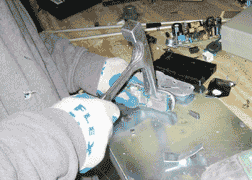
“I want recycling to be convenient for everyone,” Steffey says.
Visit any of Calvert County’s landfills, and next to the compactor you’ll find a container for mobile devices and rechargeable batteries.
Once a month, Steffey collects the phones — usually about 30 — packages them in prepaid boxes and ships them to Rechargeable Battery Recycling Corporation, located in Georgia.
The recycling company refurbishes and resells mobile devices when possible. With unsalvageable cell phones, it follows a process similar to that of Collective Good International. Thermal recovery reclaims metals — nickel, iron, cadmium, lead and cobalt — for reuse in manufacturing new products.
Like Calvert County, Anne Arundel County offers mobile device recycling at all of its convenience centers.
Electronic recycling is collected daily and transported to Computer Donations Management in Baltimore, a private company where electronic devices are separated into useable and recyclable materials.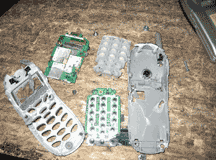
Computer Donations Management provides another much needed community service. “We employ about 60 developmentally disabled people and ex-offenders who dismantle electronic equipment, including cell phones,” says co-founder Bob Donald.
The company pledges to protect your privacy, too. “We destroy all cell phones to ensure privacy, but we’re working on integrating a software program to erase all information from cell phones for reuse,” says John Michael Pjura, spokesman for Computer Donations Management business development.
After dismantling and sorting, the electronic devices travel to a smelter for reclaiming of precious metals. “In each phone, there’s a negligible amount of precious metals, but with large quantities you get a substantial amount of gold, silver and palladium,” explains Donald.
It’s Your Call
When you choose a mobile device as your digital companion for the next year or two, you select a hand-set that satisfies your needs. If you want to download music, a phone without an MP3 player wouldn’t suffice. If your fingers constantly type text messages or emails, a device with a keyboard makes life easier.
When you decide that your cell phone has served its time, choose a fitting farewell. By recycling, you’ll keep harmful chemicals out of landfills, contribute raw materials for the next generation of electronic creations or provide a life-line for a local senior citizen — all while keeping your home clutter-free.



